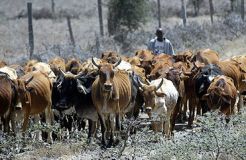Armed Sudanese herders invade Ugandan park
Jan 20, 2006 (KAMPALA) — Two thousand heavily armed Sudanese tribesmen have driven 65,000 heads of livestock across the border into a wildlife reserve in Uganda in search of water and pasture for their herds, in a bid to survive the searing drought gripping east Africa, Ugandan officials said Friday.
 The Uganda Wildlife Authority (UWA) said the Toposa herders from southern Sudan had begun arriving in the northeastern Kidepo Valley National Park with their cattle, goats, sheep and donkeys several weeks ago.They were refusing to leave, raising deep concerns about protected animals in the sanctuary, notably cheetahs.
The Uganda Wildlife Authority (UWA) said the Toposa herders from southern Sudan had begun arriving in the northeastern Kidepo Valley National Park with their cattle, goats, sheep and donkeys several weeks ago.They were refusing to leave, raising deep concerns about protected animals in the sanctuary, notably cheetahs.
“Their weapons are superior and more modern than those of our game wardens,” UWA spokeswoman Lillian Nsubuga said “We are greatly concerned about our park.”
She said wardens estimated that the Toposa had occupied more than 15 square kilometers (six square miles) of the park, where they were grazing 40,000 cows, 10,000 goats, 10,000 sheep and 5,000 donkeys. They were staying put despite an apparent agreement to leave.
“We are in a dilemma. They agreed to leave but they are not moving,” Nsubuga said. She said there were fears the livestock would not only degrade the wildlife habitat in the park but could also expose non-domesticated fauna to dangerous diseases.
UWA officials declined to disclose the number of wardens in the park but said they would definitiely be outnumbered by the Topose contingent, now camped there with automatic weapons.
The 1,440-square-kilometer (556-square-mile) Kidepo park is tucked into the corner of Uganda’s border with Sudan and Kenya and is known for its stunning beauty, fertile land and rich variety of wildlife.The latter includes cheetahs, rare wild dogs and ostriches.
The arrival of the Toposa in the park coincides with dire warnings that up to 11 million people across east Africa are at risk of famine from the drought, which has also raised fears about the region’s famed wildlife.
In neighboring Kenya, wildlife officials have already sounded the alarm about the drought’s effect on elephants and hippos. Elephants have been increasingly leaving sanctuaries in search of food, coming into greater conflict with humans and river-dwelling hippos have been dying in large numbers as due to low water levels.
